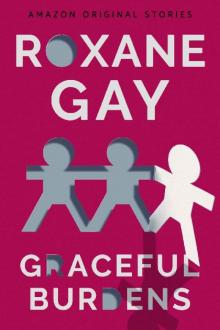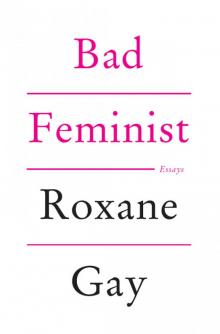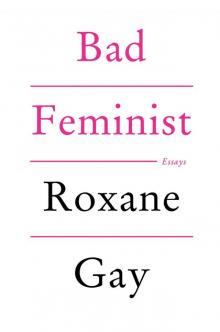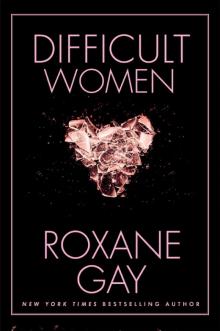- Home
- Roxane Gay
Hunger
Hunger Read online
Dedication
for you, my sunshine, showing me what I no longer need and finding the way to my warm
Contents
Cover
Title Page
Dedication
I 1
2
3
4
5
6
7
8
9
II 10
11
12
13
14
15
16
17
18
19
20
21
22
23
24
25
26
27
28
29
III 30
31
32
33
34
35
36
37
38
39
40
41
IV 42
43
44
45
46
47
48
49
50
51
52
53
54
55
56
57
58
59
60
61
62
V 63
64
65
66
67
68
69
70
71
72
73
74
75
76
77
78
79
80
VI 81
82
83
84
85
86
87
88
Acknowledgments
About the Author
Also by Roxane Gay
Copyright
About the Publisher
I
1
Every body has a story and a history. Here I offer mine with a memoir of my body and my hunger.
2
The story of my body is not a story of triumph. This is not a weight-loss memoir. There will be no picture of a thin version of me, my slender body emblazoned across this book’s cover, with me standing in one leg of my former, fatter self’s jeans. This is not a book that will offer motivation. I don’t have any powerful insight into what it takes to overcome an unruly body and unruly appetites. Mine is not a success story. Mine is, simply, a true story.
I wish, so very much, that I could write a book about triumphant weight loss and how I learned how to live more effectively with my demons. I wish I could write a book about being at peace and loving myself wholly, at any size. Instead, I have written this book, which has been the most difficult writing experience of my life, one far more challenging than I could have ever imagined. When I set out to write Hunger, I was certain the words would come easily, the way they usually do. And what could be easier to write about than the body I have lived in for more than forty years? But I soon realized I was not only writing a memoir of my body; I was forcing myself to look at what my body has endured, the weight I gained, and how hard it has been to both live with and lose that weight. I’ve been forced to look at my guiltiest secrets. I’ve cut myself wide open. I am exposed. That is not comfortable. That is not easy.
I wish I had the kind of strength and willpower to tell you a triumphant story. I am in search of that kind of strength and willpower. I am determined to be more than my body—what my body has endured, what my body has become. Determination, though, has not gotten me very far.
Writing this book is a confession. These are the ugliest, weakest, barest parts of me. This is my truth. This is a memoir of (my) body because, more often than not, stories of bodies like mine are ignored or dismissed or derided. People see bodies like mine and make their assumptions. They think they know the why of my body. They do not. This is not a story of triumph, but this is a story that demands to be told and deserves to be heard.
This is a book about my body, about my hunger, and ultimately, this is a book about disappearing and being lost and wanting so very much, wanting to be seen and understood. This is a book about learning, however slowly, to allow myself to be seen and understood.
3
To tell you the story of my body, do I tell you how much I weighed at my heaviest? Do I tell you that number, the shameful truth of it always strangling me? Do I tell you I know I should not consider the truth of my body shameful? Or do I just tell you the truth while holding my breath and awaiting your judgment?
At my heaviest, I weighed 577 pounds at six feet, three inches tall. That is a staggering number, one I can hardly believe, but at one point, that was the truth of my body. I learned of the number at a Cleveland Clinic in Weston, Florida. I don’t know how I let things get so out of control, but I do.
My father went with me to Cleveland Clinic. I was in my late twenties. It was July. Outside, it was hot and muggy and lushly green. In the clinic, the air was frigid and antiseptic. Everything was slick, expensive wood, marble. I thought, This is how I am spending my summer vacation.
There were seven other people in the meeting room—an orientation session for gastric bypass surgery—two fat guys, a slightly overweight woman and her thin husband, two people in lab coats, and another large woman. As I surveyed my surroundings, I did that thing fat people tend to do around other fat people—I measured myself in relation to their size. I was bigger than five, smaller than two. At least, that is what I told myself. For $270, I spent a good portion of my day listening to the benefits of having my anatomy drastically altered to lose weight. It was, the doctors said, “the only effective therapy for obesity.” They were doctors. They were supposed to know what was best for me. I wanted to believe them.
A psychiatrist talked to those of us assembled about how to prepare for the surgery, how to deal with food once our stomachs became the size of a thumb, how to accept that the “normal people” (his words, not mine) in our lives might try to sabotage our weight loss because they were invested in the idea of us as fat people. We learned how our bodies would be nutrient-deprived for the rest of our lives, how we would never be able to eat or drink within half an hour of doing one or the other. Our hair would thin, maybe fall out. Our bodies could be prone to dumping syndrome, a condition whose name doesn’t require a great deal of imagination to decipher. And of course, there were the surgical risks. We could die on the operating table or succumb to infection in the days following the procedure.
It was a good news/bad news scenario. Bad news: our lives and bodies would never be the same (if we even survived the surgery). Good news: we would be thin. We would lose 75 percent of our excess weight within the first year. We would become next to normal.
What those doctors offered was so tempting, so seductive: this notion that we could fall asleep for a few hours, and within a year of waking up, most of our problems would be solved, at least according to the medical establishment. That is, of course, if we continued to delude ourselves that our bodies were our biggest problem.
After the presentation there was a question-and-answer session. I had neither questions nor answers, but the woman to my right, the woman who clearly did not need to be there because she was no more than forty or so pounds overweight, dominated the session, asking intimate, personal questions that broke my heart. As she interrogated the doctors, her husband sat next to her, smirking. It became clear why she was there. It was all about him and how he saw her body. There is nothing sadder, I thought, choosing to ignore why I was sitting in that same r
oom, choosing to ignore that there were a great many people in my own life who saw my body before they ever saw or considered me.
Later in the day, the doctors showed videos of the surgery—cameras and surgical tools in slick inner cavities cutting, pushing, closing, removing essential parts of the human body. The insides were steamy red and pink and yellow. It was grotesque and chilling. My father, on my left, was ashen, clearly shaken by the brutal display. “What do you think?” he asked quietly. “This is a total freak show,” I said. He nodded. This was the first thing we had agreed on in years. Then the video ended and the doctor smiled and chirped that the procedure was brief, done laparoscopically. He assured us he had done over three thousand operations, lost only one patient—an 850-pound man, he said, his voice dropping to an apologetic whisper, as if the shame of that man’s body could not be spoken with the full force of his voice. Then, the doctor told us the price of happiness—$25,000, minus a $270 discount for the orientation fee once a deposit for the procedure was made.
Before this torment was over, there was a one-on-one consultation with the doctor in a private examination room. Before the doctor entered, his assistant, an intern, took down my vital information. I was weighed, measured, quietly judged. The intern listened to my heartbeat, felt my throat glands, made some additional notes. The doctor finally breezed in after half an hour. He looked me up and down. He glanced at my new chart, quickly flipping through the pages. “Yes, yes,” he said. “You’re a perfect candidate for the surgery. We’ll get you booked right away.” Then he was gone. The intern wrote me prescriptions for the preliminary tests I would need, and I left with a letter verifying that I’d completed the orientation session. It was clear that they did this every day. I was not unique. I was not special. I was a body, one requiring repair, and there are many of us in this world, living in such utterly human bodies.
My father, who had been waiting in the well-appointed atrium, put a hand on my shoulder. “You’re not at this point yet,” he said. “A little more self-control. Exercising twice a day. That’s all you need.” I agreed, nodding vigorously, but later, alone in my bedroom, I pored over the pamphlets I had received, unable to look away from the before/after pictures. I wanted, I still want, that after so badly.
And I remembered the result of being weighed and measured and judged, the unfathomable number: 577 pounds. I thought I had known shame in my life, but that night, I truly knew shame. I did not know if I would ever find my way past that shame and toward a place where I could face my body, accept my body, change my body.
4
This book, Hunger, is a book about living in the world when you are not a few or even forty pounds overweight. This is a book about living in the world when you are three or four hundred pounds overweight, when you are not obese or morbidly obese but super morbidly obese according to your body mass index, or BMI.
“BMI” is a term that sounds so technical and inhumane that I am always eager to disregard the measure. Nonetheless, it is a term, and a measure, that allows the medical establishment to try and bring a sense of discipline to undisciplined bodies.
One’s BMI is one’s weight, in kilograms, divided by the square of one’s height in meters. Math is hard. There are various markers that then define the amount of unruliness a human body might carry. If your BMI is between 18.5 and 24.9, you are “normal.” If your BMI is 25 or higher, you are overweight. If your BMI is 30 or higher, you are obese, and if your BMI is higher than 40, you are morbidly obese, and if the measure is higher than 50, you are super morbidly obese. My BMI is higher than 50.
In truth, many medical designations are arbitrary. It is worth noting that in 1998, medical professionals, under the direction of the National Heart, Lung, and Blood Institute, lowered the BMI threshold for “normal” bodies to below 25 and, in doing so, doubled the number of obese Americans. One of their reasons for lowering the cutoff: “A round number like 25 would be easy for people to remember.”
These terms themselves are somewhat horrifying. “Obese” is an unpleasant word from the Latin obesus, meaning “having eaten until fat,” which is, in a literal sense, fair enough. But when people use the word “obese,” they aren’t merely being literal. They are offering forth an accusation. It is strange, and perhaps sad, that medical doctors came up with this terminology when they are charged with first doing no harm. The modifier “morbidly” makes the fat body a death sentence when such is not the case. The term “morbid obesity” frames fat people like we are the walking dead, and the medical establishment treats us accordingly.
The cultural measure for obesity often seems to be anyone who appears to be larger than a size 6, or anyone whose body doesn’t naturally cater to the male gaze, or anyone with cellulite on her thighs.
I do not weigh 577 pounds now. I am still very fat, but I weigh about 150 pounds less than that. With every new diet attempt I shave off a few pounds here, a few pounds there. This is all relative. I am not small. I will never be small. For one, I am tall. That is both a curse and a saving grace. I have presence, I am told. I take up space. I intimidate. I do not want to take up space. I want to go unnoticed. I want to hide. I want to disappear until I gain control of my body.
I don’t know how things got so out of control, or I do. This is my refrain. Losing control of my body was a matter of accretion. I began eating to change my body. I was willful in this. Some boys had destroyed me, and I barely survived it. I knew I wouldn’t be able to endure another such violation, and so I ate because I thought that if my body became repulsive, I could keep men away. Even at that young age, I understood that to be fat was to be undesirable to men, to be beneath their contempt, and I already knew too much about their contempt. This is what most girls are taught—that we should be slender and small. We should not take up space. We should be seen and not heard, and if we are seen, we should be pleasing to men, acceptable to society. And most women know this, that we are supposed to disappear, but it’s something that needs to be said, loudly, over and over again, so that we can resist surrendering to what is expected of us.
5
What you need to know is that my life is split in two, cleaved not so neatly. There is the before and the after. Before I gained weight. After I gained weight. Before I was raped. After I was raped.
6
In the before of my life, I was so very young and sheltered. I knew nothing about anything. I didn’t know I could suffer or the breadth and scope of what suffering could be. I didn’t know that I could give voice to my suffering when I did suffer. I didn’t know there were better ways to deal with my suffering. Of all the things I wish I knew then that I know now, I wish I had known I could talk to my parents and get help, and turn to something other than food. I wish I had known that my violation was not my fault.
What I did know was food, so I ate because I understood that I could take up more space. I could become more solid, stronger, safer. I understood, from the way I saw people stare at fat people, from the way I stared at fat people, that too much weight was undesirable. If I was undesirable, I could keep more hurt away. At least, I hoped I could keep more hurt away because in the after, I knew too much about hurt. I knew too much about hurt, but I didn’t know how much more a girl could suffer until I did.
But. This is what I did. This is the body I made. I am corpulent—rolls of brown flesh, arms and thighs and belly. The fat eventually had nowhere to go, so it created its own paths around my body. I am riven with stretch marks, pockets of cellulite on my massive thighs. The fat created a new body, one that shamed me but one that made me feel safe, and more than anything, I desperately needed to feel safe. I needed to feel like a fortress, impermeable. I did not want anything or anyone to touch me.
I did this to myself. This is my fault and my responsibility. This is what I tell myself, though I should not bear the responsibility for this body alone.
7
This is the reality of living in my body: I am trapped in a cage. The frustrating thing about ca
ges is that you’re trapped but you can see exactly what you want. You can reach out from the cage, but only so far.
It would be easy to pretend I am just fine with my body as it is. I wish I did not see my body as something for which I should apologize or provide explanation. I’m a feminist and I believe in doing away with the rigid beauty standards that force women to conform to unrealistic ideals. I believe we should have broader definitions of beauty that include diverse body types. I believe it is so important for women to feel comfortable in their bodies, without wanting to change every single thing about their bodies to find that comfort. I (want to) believe my worth as a human being does not reside in my size or appearance. I know, having grown up in a culture that is generally toxic to women and constantly trying to discipline women’s bodies, that it is important to resist unreasonable standards for how my body or any body should look.
What I know and what I feel are two very different things.
Feeling comfortable in my body isn’t entirely about beauty standards. It is not entirely about ideals. It’s about how I feel in my skin and bones, from one day to the next.
I am not comfortable in my body. Nearly everything physical is difficult. When I move around, I feel every extra pound I am carrying. I have no stamina. When I walk for long periods of time, my thighs and calves ache. My feet ache. My lower back aches. More often than not, I am in some kind of physical pain. Every morning, I am so stiff I contemplate just spending the duration of the day in bed. I have a pinched nerve, and so if I stand for too long, my right leg goes numb and then I sort of lurch about until the feeling returns.
When it’s hot, I sweat profusely, mostly from my head, and then I feel self-conscious and find myself constantly wiping the sweat from my face. Rivulets of sweat spring forth between my breasts and pool at the base of my spine. My shirt gets damp and sweat stains begin seeping through the fabric. I feel like people are staring at me sweating and judging me for having an unruly body that perspires so wantonly, that dares to reveal the costs of its exertion.

 Graceful Burdens (Out of Line collection)
Graceful Burdens (Out of Line collection) The Best American Short Stories 2018
The Best American Short Stories 2018 Bad Feminist
Bad Feminist Bad Feminist: Essays
Bad Feminist: Essays Ayiti
Ayiti Difficult Women
Difficult Women An Untamed State
An Untamed State Hunger
Hunger